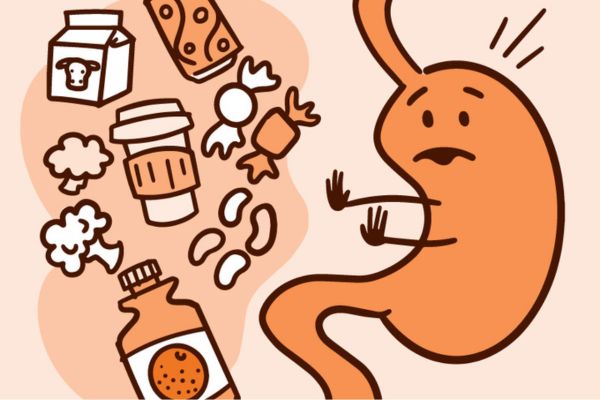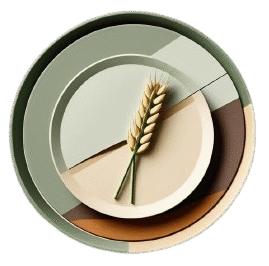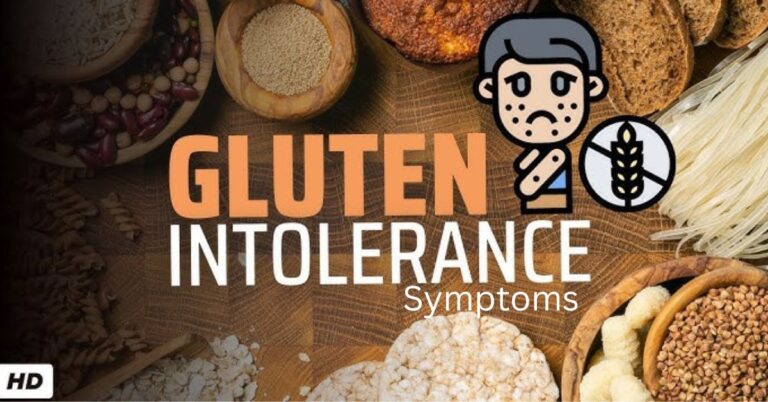“Is It Gluten or Something Else? How to Tell When Your Gut Acts Up”
Determining if gut issues are due to gluten or something else involves identifying specific symptoms, understanding the potential causes, and potentially consulting a doctor for diagnosis and treatment.
Key symptoms that may indicate a gluten issue include abdominal pain, bloating, diarrhea, constipation, and skin problems like dermatitis herpetiformis.
However, these symptoms can also be associated with other conditions like IBS, so further investigation is often needed.
There are different gluten related disorders (GRDs) such as celiac disease, non celiac gluten sensitivity (NCGS), and wheat allergy can affect your skin, digestive system(make your guts acting up), mood, and joints.
If you are facing digestive problems(Your gut acts up) and want to make sure that it is because of gluten or something else then this page is for you. This article will help you to learn all about gluten.
What is gluten?

Gluten is a protein found in the wheat plant and some other grains. Gluten is naturally occurring, but it can be extracted, concentrated and added to food and other products to add protein, texture and flavor.
It also works as a binding agent to hold processed foods together and give them shape.
Where does gluten come from?
In addition to wheat, gluten also comes from rye, barley and triticale (a cross between rye and barley). Sometimes it’s in oats, but only because the oats may have been processed with other foods that contain gluten. Oats themselves don’t contain gluten.
What Does Gluten Do to Your Body?
Humans have digestive enzymes that help us break down food. Protease is the enzyme that helps our body process proteins, but it can’t completely break down gluten. Undigested gluten makes its way to the small intestine.
Most people can handle the undigested gluten with no problems. But in some people, gluten can trigger a severe autoimmune response or other unpleasant symptoms.
An autoimmune response to gluten is called celiac disease. Celiac can damage the small intestine. Some people who don’t have celiac disease still seem to feel sick after eating foods that contain gluten.
They may experience bloating, diarrhea, headaches or skin rashes. This could be a reaction to poorly digested carbohydrates, not just gluten. These carbs, called fodmaps, ferment in your gut. People with sensitive guts may experience discomfort from that fermentation, not necessarily from gluten.
Research suggests that some people could have small intestines that don’t work properly. The lining might be too permeable, allowing some undigested gluten, bacteria or other substances to go through the lining and into the bloodstream, causing inflammation.
Is It Gluten or Something Else? How to Tell When Your Gut Acts Up

If you have a disturbed gut health or digestive health wondering, Is it because of gluten or something else, then follow the steps described below;
First step: Identify potential gluten related symptoms
- Digestive discomfort
Digestive discomfort is one of the gluten intolerance symptoms. Digestive discomfort includes abdominal pain, bloating, gas, diarrhea, and constipation. These common gastrointestinal symptoms can be triggered by gluten.
- Skin issues
Dermatitis herpetiformis is a specific skin condition associated with celiac disease, a condition that necessitates gluten free diets. If you have dermatitis herpetiformis that means you may have gluten intolerance or any other gluten sensitivity.
- Other symptoms
There are some other symptoms like fatigue, headaches, joint pain, and even anxiety or depression can be linked to gluten sensitivity.
If your body shows these or some of these symptoms also with acting your guts up then it is possible that you are sensitive to gluten and you should avoid gluten. But the best thing is to consult with the doctor for confirmation.
Second step: Consider other potential causes
Some other causes may also be responsible for your disturb gut health and or digestive health. There are some other potential causes;
- IBS
Irritable bowel syndrome (IBS) is a group of symptoms that affect your digestive system. It’s a common but uncomfortable gastrointestinal disease, or condition that affects your intestines.
People with IBS experience symptoms that include abdominal pain and cramps. With IBS, you may also have frequent diarrhea, constipation or both.
Irritable bowel syndrome similar gut symptoms, include cramping, belly pain, bloating, gas, and diarrhea or constipation, or both.
There are three types of IBS;
- IBS with constipation (IBS-C): Most of your poop is hard and lumpy.
- IBS with diarrhea (IBS-D): Most of your poop is loose and watery.
- IBS with mixed bowel habits (IBS-M): You have both hard and lumpy bowel movements and loose and watery movements.
The differences are important. Certain treatments only work for specific types of IBS.
- Celiac disease
Celiac disease is the most severe gluten related disorder. It’s an autoimmune disease that affects about 1% of the population and may damage the digestive system.
Celiac disease can cause many symptoms, including skin problems, digestive issues, and mood changes. It’s disruptive to daily life without the appropriate diagnosis and management.
Here are a few of the most common symptoms of celiac disease.
Symptoms of celiac desease
- Eating foods that contain gluten can trigger a range of gut symptoms, such as:
- diarrhoea, which may smell particularly unpleasant
- stomach aches
- bloating and farting (flatulence)
- indigestion
- constipation
- Coeliac disease can also cause more general symptoms, including:
- tiredness (fatigue) as a result of not getting enough nutrients from food (malnutrition)
- unintentional weight loss
- an itchy rash (dermatitis herpetiformis)
- problems getting pregnant (infertility)
- nerve damage (peripheral neuropathy)
- disorders that affect coordination, balance and speech (ataxia)
Children with coeliac disease may not grow at the expected rate and may have delayed puberty.
- Food Intolerances
Other food intolerances can also trigger similar symptoms such as wheat allergy.
Wheat allergy
Wheat allergy is a food allergy that causes your body’s immune system to react to certain proteins found in wheat, including gluten and other compounds.
Wheat allergy is more common among children than adults. It’s estimated that approximately 66% of children outgrow wheat allergies by age 12.
Here are a few of the most common symptoms of wheat allergy:
A person with wheat allergy is likely to develop signs and symptoms within minutes to hours after eating something containing wheat. Wheat allergy signs and symptoms include:
- Swelling, itching or irritation of the mouth or throat
- Hives, itchy rash or swelling of the skin
- Nasal congestion
- Headache
- Difficulty breathing
- Cramps, nausea or vomiting
- Diarrhea
- Anaphylaxis
Third step: Seek Professional Guidance
- Consult a Doctor
A doctor can help determine if gluten is the culprit by ruling out other conditions like IBS or celiac disease.
- Consider a Blood Test
Blood tests can help diagnose celiac disease and identify antibodies related to gluten sensitivity.
- Dietary Changes
In some cases, a doctor may suggest a temporary gluten free diet to see if symptoms improve.
Fourth step: Manage Gut Issues
- Gluten Free Diet
If gluten is identified as the cause, a strict gluten-free diet is crucial to manage symptoms.
- Probiotics
Probiotic supplements or foods rich in probiotics, like yogurt, can help support gut health.
- Anti Inflammatory Foods
Foods like leafy greens, turmeric, and ginger can help reduce inflammation in the gut.
What should I do if I think I have a gluten problem?
As we discussed above you should consult a physician if you think gluten could be affecting your health. Your doctor may suggest blood tests to detect celiac disease or a wheat allergy. Before cutting gluten out of your diet, work with a registered dietitian to build an eating plan that’s right for you.
You may wondering
Frequently Asked Questions
Q. Am I gluten intolerant or something else?
Ans. Signs of gluten intolerance also include non gastrointestinal symptoms. These include headaches, tiredness, brain fog, joint and muscle pain, and skin rash.
Symptoms usually happen a few hours or days after you have eaten gluten. Gluten intolerance symptoms should go away if you stop eating any more gluten.
Q. How do you know if your stomach doesn’t like gluten?
Ans. What is gluten intolerance? You may have a gluten intolerance if you get sick after eating gluten, a type of protein. You might feel tired, nauseous or bloated. Another name for gluten intolerance is non-celiac gluten sensitivity (NCGS).
Q. What does a gluten flare up feel like?
Ans. Abdominal pain, bloating, constipation, diarrhea, and gas are common reactions to gluten in people with celiac disease. Although it’s not common, vomiting can occur, especially if you’ve ingested a large amount of gluten (think: a slice of pizza or a doughnut, as opposed to a few crumbs).
Q. How do I clear my gut of gluten?
Ans. The most effective treatment for gluten intolerance is a strict gluten free diet. This involves eliminating all sources of gluten and incorporating gut-healing foods such as bone broths, leafy greens, and probiotics.



